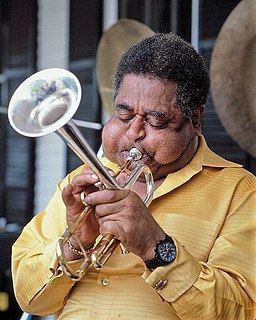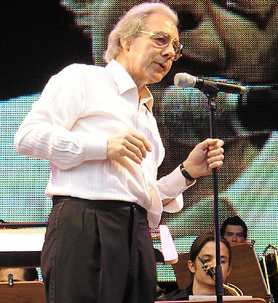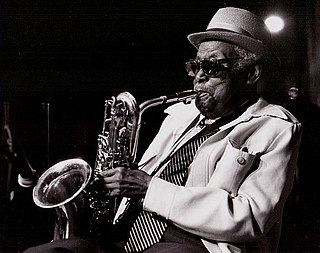
John Birks "Dizzy" Gillespie was an American jazz trumpeter, bandleader, composer, educator and singer. He was a trumpet virtuoso and improviser, building on the virtuoso style of Roy Eldridge but adding layers of harmonic and rhythmic complexity previously unheard in jazz. His combination of musicianship, showmanship, and wit made him a leading popularizer of the new music called bebop. His beret and horn-rimmed spectacles, scat singing, bent horn, pouched cheeks, and light-hearted personality provided one of bebop's most prominent symbols.

Raymond Hart Massey was a Canadian actor, known for his commanding, stage-trained voice. For his lead role in Abe Lincoln in Illinois (1940), Massey was nominated for the Academy Award for Best Actor. Among his most well known roles were Dr Gillespie in the NBC television series Dr. Kildare (1961–1966), Abraham Farlan in A Matter of Life and Death and Jonathan Brewster in Arsenic and Old Lace (1944).

Raymond Matthews Brown was an American jazz double bassist known for extensive work with Oscar Peterson and Ella Fitzgerald.

Alexander Gillespie Raymond Jr. was an American cartoonist who was best known for creating the Flash Gordon comic strip for King Features Syndicate in 1934. The strip was subsequently adapted into many other media, from three Universal movie serials to a 1970s television series and a 1980 feature film.

Gillespie, Kidd & Coia were a Scottish architectural firm famous for their application of modernism in churches and universities, as well as at St Peter's Seminary in Cardross. Though founded in 1927, it is for their work in the post-war period that they are best known. The firm was wound up in 1987.

Boris Claudio "Lalo" Schifrin is an Argentine-American pianist, composer, arranger and conductor. He is best known for his large body of film and TV scores since the 1950s, incorporating jazz and Latin American musical elements alongside traditional orchestrations. He is a five-time Grammy Award winner, and has been nominated for six Academy Awards and four Emmy Awards.

John Frederick Coots was an American songwriter. He composed over 700 popular songs and over a dozen Broadway shows. In 1934, Coots wrote the melody with his then chief collaborator, lyricist Haven Gillespie, for the biggest hit of either man's career, "Santa Claus Is Comin' to Town." The song became one of the biggest sellers in American history.
"A Night in Tunisia" is a musical composition written by Dizzy Gillespie around 1940–42, while Gillespie was playing with the Benny Carter band. It has become a jazz standard. It is also known as "Interlude", and with lyrics by Raymond Leveen was recorded by Sarah Vaughan in 1944.

Cecil Payne was an American jazz baritone saxophonist born in Brooklyn, New York. Payne also played the alto saxophone and flute. He played with other prominent jazz musicians, in particular Dizzy Gillespie and Randy Weston, in addition to his solo work as bandleader.

Groovin' High is a 1955 compilation album of studio sessions by jazz composer and trumpeter Dizzy Gillespie. The Rough Guide to Jazz describes the album as "some of the key bebop small-group and big band recordings."
Albert Arnold "Buddy" Gillespie was an American cinema special effects artist.
Thomas Gillespie may refer to:
Thomas, Tom or Tommy Cunningham may refer to:
Montreal Concordia FC was a Canadian soccer team based in Montreal, Quebec, formerly known as Sparta FC and then Canadian Alouettes FC. The club won Canadian titles in 1959 and 1961.
Events from 1615 in Ireland.
George Gillespie (1613–1648) was a Scottish theologian.
Dizzy is a nickname, Notable people with the nickname include:
Alexander Garfield Gillespie, sometimes known as A. G. Gillespie, was an American football player and a brigadier general in the United States Army.

Nell Battle Lewis was an American journalist and lawyer in North Carolina. She was an advocate for worker's and women's rights, and at the end of her career the threat of communism, and perhaps the best known female advocate for racial segregation.
Gillespie is both a masculine given name, and a surname in the English language. The given name is an Anglicised form of the Gaelic Gille Easbaig, meaning "bishop's servant". The surname Gillespie is an Anglicised form of the Scottish Gaelic Mac Gille Easbuig, and the Irish Mac Giolla Easpaig, both of which mean "servant of the bishop". The given name itself is derived from a word of Latin origin. Specifically, the Old Irish epscop being derived from the Latin episcopus. An early example of the name in Scotland occurs in a charter dated 1175–1199, recording a certain "Ewano filio Gillaspeck". In Ireland, a family bearing the surname occupied the office of toísech of Clann Aílebra in the late twelfth century. In 1172, for example, the toísech was slain by Donn Slébe Ua hEochada, King of Ulster. This slain Mac Gilla Espuic may be identical to a certain Gilla Óengusa mac Gilla Espuic, rechtaire of the Monaig of Ulster, who is earlier recorded in the king's service. Whatever the case, a later family bearing the surname appears on record as erenaghs of Kilraine in County Donegal. During the sixteenth- and seventeenth-centuries in Ireland, the surname is most common in Ulster. During the nineteenth century in Ireland, the surname was most numerous in the counties of Antrim, Donegal, Armagh, and Tyrone. Scottish Gaelic forms of the surname include GillEasbuig, and GillEasbaig.









